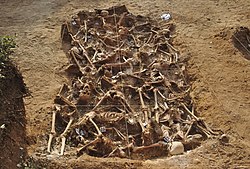Civil war
| It never changes War |
| A view to kill |
A civil war is any war that occurs within a state, rather than among states.[note 1] Based on multifactoral statistical analysis, it has been found that modern civil wars are most likely to start when a government either moves from democracy towards authoritarianism or vice versa.[1]:12-14,35-36[2][3][4] Among all the factors considered, rapid transition towards a government type that is neither wholly democratic nor wholly autocratic (anocracy), using a scale similar to the Democracy Index, was the most likely predictor of civil war onset. As governments transition towards anocracy, factional disgruntlement becomes a greater force in politics, having either been actively suppressed in autocracies or channeled into minority rights and election processes in democracies. During anocracy, elites and their factional supporters see it as an opportunity for seizing more power.[1]:37-38 The likelihood of a civil war increases when a country has a superfaction, a faction that shares the same ethnicity as well as another form of identity (religion, social class, or geographic location).[1]:39 Factions are also more likely to resort to violence when their status or power has been reduced.[1]:52 The desire for civil war is often inflamed by people known as 'ethnic entrepreneurs', people who exploit fear and promote bigotry and discrimination for their own personal gain.[1]:44 Examples of ethnic entrepreneurs include:[1]:44-51,121-124,144,150,152,224
- Omar al-Bashir
 (Arab Muslim in Sudan)
(Arab Muslim in Sudan) - Tucker Carlson, Sean Hannity and Donald Trump (white supremacy in the United States)
- Marine Le Pen (anti-immigration in France)
- Slobodan Milošević and Radovan Karadžić
 (Serbs in Yugoslavia)
(Serbs in Yugoslavia) - Narendra Modi (Hindus in India)
- Léon Mugesera
 (Hutus in Rwanda)
(Hutus in Rwanda) - Franjo Tuđman
 (Croats in Yugoslavia)
(Croats in Yugoslavia) - Paul Joseph Watson (Islamophobia)
- Pete Wilson,
 won the 1994 California governor's race on an explicitly anti-immigrant platform
won the 1994 California governor's race on an explicitly anti-immigrant platform
Due to the extremely high feelings fanned by civil wars, they tend to become the bloodiest and most intractable wars possible; in other words, they aren't, in fact, very civil.[5] Examples of this include the civil wars in Rwanda and in Yugoslavia (circa 1990s). Nowadays[6] most other nations are loath to interfere in a civil war for this reason. However, civil wars often have effects beyond the border of the state experiencing it, as refugees flee to bordering states or combatants try to use neutral states as a hiding-ground.
There have been many cases where a civil war has changed history for the entire world. Prominent examples include the Russian Civil War (1917-1923, occasioning the birth of the Soviet Union in 1922), the Spanish Civil War of 1936 to 1939 (when Hitler and Mussolini tested tactics and weapons while backing Francisco Franco against the proteges of Stalin), the American Civil War of 1861-1865 (when the US government became more centralized after defeating secession), and the Chinese Civil War (when the Communist Party came to power and established the Peoples' Republic in 1949).
Civil wars with their own pages[edit]
See also[edit]
Notes[edit]
- ↑ Sit down, Americans.
References[edit]
- ↑ 1.0 1.1 1.2 1.3 1.4 1.5 How Civil Wars Start: And How to Stop Them by Barbara F. Walter (2022) ISBN 0593137787.
- ↑ Colorful Community or Ethnic Witches' Brew?: Multiethnicity and Domestic Conflict during and after the Cold War by Tanja Ellingsen (2000) Journal of Conflict Resolution 44(2):228-249. doi:10.1177/0022002700044002004.
- ↑ Greed and grievance in civil war by Paul Collier & Anke Hoeffler (2004) Oxford Economic Papers 56:563–595. doi:10.1093/oep/gpf064.
- ↑ Polarization and Conflict: Theoretical and Empirical Issues: Introduction by Joan Esteban & Gerald Schneider (2008) Journal of Peace Research 45(2):131-141. doi:10.1177/0022343307087168.
- ↑ Ann Hironaka, Neverending Wars: The International Community, Weak States, and the Perpetuation of Civil War, Harvard University Press: Cambridge, Mass., 2005, p. 3, ISBN 0-674-01532-0
- ↑ Back then bigger countries (who usually can pwn both sides simultaneously) intervene to put the country into their "sphere of influence".
